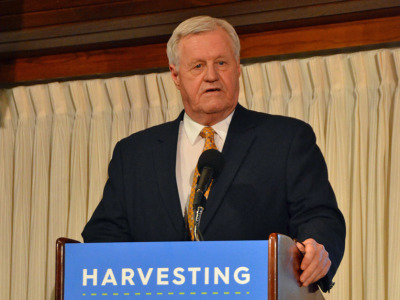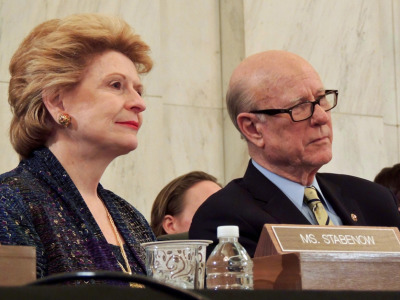The House Agriculture Committee is preparing to debate a Republican farm bill as early as next week, but the legislation’s future on the House floor remains up in the air as Democrats show no signs of backing off their opposition.
In a sign of how divided the committee is as the markup nears, the top Democrat, Collin Peterson, says he is getting cost estimates for increasing commodity reference prices in the Price Loss Coverage program, a change that would increase payments to farmers.
Speaking Tuesday at a meeting of the North American Agricultural Journalists, Peterson stopped short of saying for sure that he would offer the PLC amendment, which could deepen the partisan split over the legislation when the expiration of the 2014 farm bill is less than six months away.

Rep. Collin Peterson, D-Minn.
“We haven’t decided what to do,” he said, speaking for fellow Democrats on the committee. “You can put lipstick on a pig. It’s still a pig.”
The committee’s chairman, Mike Conaway, already is concerned about whether committee Democrats, angry about the bill’s reforms to the Supplemental Nutrition Assistance Program, may vote for amendments on the House floor that target crop insurance and commodity programs. Conaway has said he hopes that Democrats will oppose those amendments, even if they plan to vote against the bill on final passage.
But Peterson said he’s worried that committee Democrats are so angry about the bill’s nutrition title that they will refuse to protect the sugar program and crop insurance. Once lawmakers vote for an amendment, it’s difficult to get them to switch sides and vote against the amendment at a later time, he noted.
“I just think it’s dangerous business to go down that road,” he said. Democrats “are so ticked off about this that I don’t know what they’re going to do. They’re representing their people, and they’re not happy.”
In a letter to House Democrats on Monday, Minority Leader Nancy Pelosi included the farm bill in a list of bills that they should oppose. "Ranking Member Collin Peterson and 100 percent of the House Agriculture Committee Democrats oppose the unfair SNAP provisions in the GOP proposal and have said they won't support a bill that includes these cruel provisions."
Conaway is expected to release his draft bill later this week. In a statement Monday, Conaway tied the fate of the farm bill to farmers' concerns about the trade dispute with China. "Given the extraordinary circumstances, I ... hope that members of Congress will put aside any partisan rancor and join forces to deliver a strong, new farm bill on time," he said.
The partisan impasse makes it less likely that a new farm bill can get passed this year, but dairy producers and cotton growers can take heart that they got new program benefits included in a budget agreement enacted in February. The budget deal made seed cotton eligible for the Price Loss Coverage program and slashed premiums for dairy’s Margin Protection Program.
New cost estimates from the Congressional Budget Office released Tuesday illustrate how much the provisions will help producers. CBO projects that the improved MPP will cost taxpayers $1.8 billion over the next 10 years after taking into account $1.1 billion in premiums that will be paid by producers. The program is projected to provide producers with $312 million in payments in fiscal 2018 and $277 million in 2019.
Last year, CBO estimated that MPP would provide just $114 million in payments in 2018 and $143 million in 2019, with a 10-year cost of less than $800 million.
CBO expects the first PLC payments for seed cotton to go out in fiscal 2020 and total $330 million. From 2020 through 2028 the payments are expected to total nearly $3.1 billion.

Sen. Debbie Stabenow, D-Mich., and Sen. Pat Roberts, R-Kan.
CBO also confirmed its analysts' previous projections that grain and oilseed producers will move sharply from the Agriculture Risk Coverage program to PLC under a new farm bill. CBO projects PLC payments will hit $5.7 billion in fiscal 2021, compared to just $448 million for ARC under the county coverage option. PLC payments are expected to total $2.7 billion for 2019, compared to $2.6 billion for ARC-CO.
Leaders of the Senate Agriculture Committee, Chairman Pat Roberts and ranking Democrat Debbie Stabenow, continue to insist that they will move a bipartisan farm bill, but they have not given a timetable for acting on the legislation. Roberts has said he wants to get at least 70 votes on the Senate floor.
Stabenow said that “hopefully by May” the committee will act on a bill. “We certainly want to do it as soon as we can,” she said.
Roberts said that six or seven Democrats who are up for election this year have expressed interest in seeing a farm bill considered this year, and there also is interest on the Republican side.
For more news, go to www.Agri-Pulse.com.


